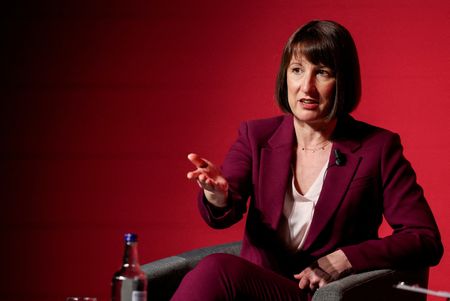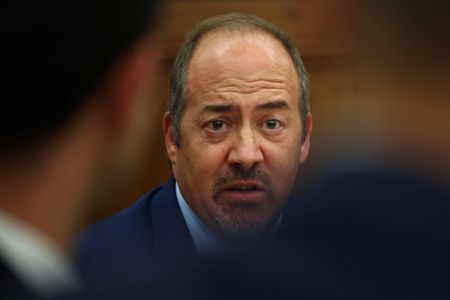By William Schomberg, David Milliken
LONDON (Reuters) -Britain’s finance minister Rachel Reeves faced criticism on Thursday after her first budget came in big on spending, tax increases and borrowing but small on economic growth, which was one of the big election promises of the Labour Party.
The unveiling of the new government’s economic programme by Reeves on Wednesday was accompanied by only tepid projections for growth and a grim outlook for living standards.
Employers have warned they will struggle to cope with the increase in social security contributions that form the lion’s share of the extra 40 billion pounds that Reeves plans to raise in tax, the biggest increase in a budget since 1993.
“The increased business costs alongside the raft of changes planned to employment regulation, are bound to act as a headwind to growth,” Ben Willmott, public policy head at the Chartered Institute of Personnel and Development, said.
The National Institute for Economics and Social Research, a think tank, said proposed exemptions for smaller firms would do little to ease the impact.
“We expect significant negative impacts on employment and wage growth, especially in low-paid sectors such as hospitality,” it said.
Reeves said the weak economic growth forecasts by the Office of Budget Responsibility “are not the summit of my ambition” and “there are more plans that we’re bringing forward to lift that growth rate.”
The OBR, whose projections underpin government budgets, said the economy was set to expand by 2.0% in 2025, up only slightly from a forecast of 1.9% made in March, at the time of the previous Conservative government’s last budget, and it trimmed its growth forecasts further out.
Reeves acknowledged there would be a hit from her increase in the rate of social security contributions.
“It will mean that businesses will have to absorb some of this through profits, and it is likely to mean that wage increases might be slightly less than they otherwise would have been,” she said.
Referring to the scale of the budget, Reeves said she did not expect to have to do “anything like that ever again”.
‘STAGNATION NATION’
She also changed the government’s fiscal rules to allow her to increase borrowing for long-term investment which she hopes will speed up the economy.
The International Monetary Fund gave its blessing to the plan for addressing urgent pressures on public services as well as supporting longer-term growth.
However, the OBR thinks it will be the 2030s before the higher public investment delivers its main boost to the economy, meaning Reeves and Prime Minister Keir Starmer could struggle to impress voters before the next election expected in 2029.
The Resolution Foundation, a think tank, said the new budget plan marked a decisive shift away from planned cuts planned by the previous Conservative government.
“But the budget has not yet delivered a decisive shift away from Britain’s record as a ‘stagnation nation’,” it said.
Growth in living standards over the next five years was likely to be only a bit stronger than during the last parliament which was the worst on record, James Smith, research director at the Resolution Foundation, said.
Reeves also faced questions about her ability to meet her new rules for the public finances, even after she relaxed the way government debt is measured to allow for more investment.
The non-partisan Institute for Fiscal Studies accused her of resorting to some of the “same silly manoeuvres” as the previous government to get the books to balance in future years.
The OBR estimates that Reeves has only 10 billion pounds ($13 billion) of headroom against a goal to balance day-to-day spending against tax revenue in five years’ time.
A second goal to reduce public sector net financial liabilities as a share of gross domestic product only had 16 billion pounds of headroom.
“There is almost no wiggle room against the two new fiscal targets,” IFS Director Paul Johnson said.
OBR chair Richard Hughes said Britain’s annual debt interest bill was set to be stuck above 100 billion pounds a year across the watchdog’s five-year forecast period for the first time, and could go higher, posing a risk to the debt reduction plan.
(Additional reporting by Muvija M and Catarina Demony; Editing by Toby Chopra)










